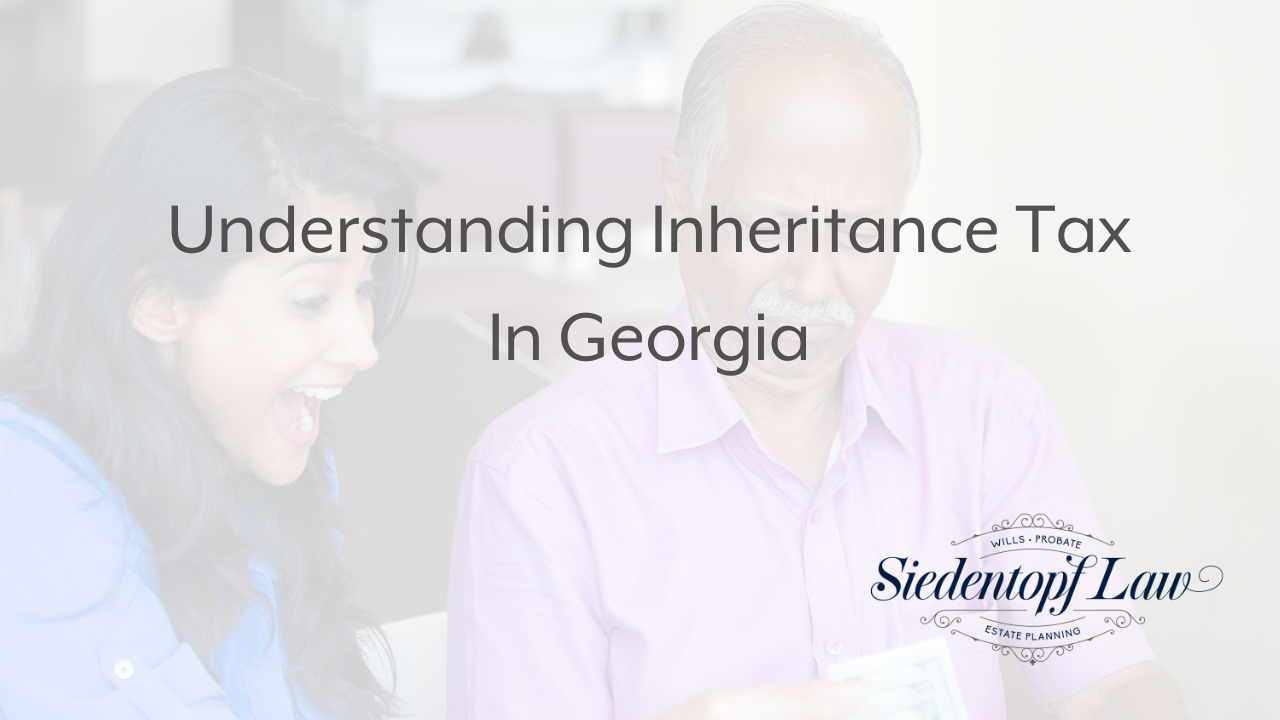When a person passes away, the assets they leave behind could be subjected to estate or inheritance taxes, depending on the state. While these taxes may be a financial burden for loved ones, not all states will levy a tax against a deceased individual’s assets. All states have their own laws regarding estate assets and taxes, including Georgia. Understanding the inheritance tax in Georgia may help to answer some questions about a loved one’s assets. Please consider scheduling a consultation by calling 404-736-6066 with Siedentopf Law to learn about estate taxes in the state of Georgia.
Inheritance Laws in Georgia
The inheritance laws in the state can be divided into two sections: testate and intestate. Any Georgia resident who passes away with a Last Will and Testament (will) is considered testate. A valid will requires a signature from the deceased and two witnesses in the state. By meeting those requirements, the court will follow the wishes outlined in the documents. In many cases, the executor will distribute all assets to the beneficiaries. The will’s executor must manage all aspects of the estate, including handling its liabilities and debts and submitting the will to probate court.
Under Georgia law, probate is the process where the inheritance is carried out according to the will. Georgia has two types of probate: solemn form and common form. With solemn form probate, all beneficiaries must be notified of the individual’s death and issued a copy of the will. Concerning the common form, there is no requirement to contact the beneficiaries or provide a copy of the will. Common form probate is rare in Georgia, and some judges don’t allow it at all. Solemn form is preferred because it makes sure that all heirs have proper notice to allow them the opportunity to contest the will if there is an issue with it. Typically, the courts will set a date for anyone to object to the will.
Georgia Inheritance Law for Those Without a Will or Other Estate Planning Documents
Those individuals who pass away without a will or other estate planning documents fall into the intestate category. The estate will proceed through Georgia’s probate process. With that, there are different possible outcomes.
- A Permanent Administration will require the heirs to receive a notification. In many cases, the spouse is designated as the administrator unless they decline or are unqualified for the role.
- Temporary Administration will often provide a notice to the heirs, but it isn’t absolutely required. It is designed for situations where there is urgency about protecting estate assets. Any distribution or expenditures are not allowed without a court order. The Temporary Administration will last until the court appoints a permanent administrator.
- There can be situations where a petition for no administration necessary is appropriate. If there is no will, all the heirs are in agreement as to the distribution of the assets, and all debts are taken care of, the court will often approve this.
Rightful Heirs in the State of Georgia
Georgia has intestate succession laws that allow the distribution of the decedent’s property to the rightful heirs. The Georgia probate court will not handle the management of the estate but would select an administrator because there is no will. Generally, the courts will choose an administrator who is an immediate family member. Under these state laws, the courts will search for relatives eligible to inherit the estate. During this time, the courts determine how to disperse the assets. In most cases, the priority will be given to the surviving spouse or children. After that, other family members may be considered, including:
- Parents
- Siblings
- Nieces and nephews
- Grandparents
- Aunts and uncles
Consider scheduling a consultation with Siedentopf Law to discuss how you want to ensure your wishes are followed after your death in the state of Georgia.
Does Georgia Have an Inheritance Tax?
When assets are distributed after a person passes away, they pass on to the heirs. Some individuals may worry about paying taxes on these assets. There is no inheritance tax in the state of Georgia. Since 2014, the state has not had an estate tax either, according to Georgia’s Department of Revenue.
These tax terms are often used interchangeably with each other, but they are slightly different. With an estate tax, the estate must pay tax before the distribution of property or assets to heirs. In contrast, inheritance taxes are levied against heirs after they receive money or property from the deceased. There are only a few states in the country that have an inheritance tax, and they include the following:
- Nebraska
- Iowa
- Kentucky
- Pennsylvania
- New Jersey
- Maryland
- Delaware
Individuals in Georgia will not have to pay any inheritance tax to the state. In most cases, they do not have to pay any estate taxes either. This type of asset and money is not considered ordinary income. Therefore, the state does not consider it taxable. Retirement accounts are different though. Heirs could be required to pay a tax on retirement accounts when they withdraw assets from the account. While Georgia residents do not have to pay state taxes, that does not absolve them from paying taxes on assets received from a deceased individual. According to the Internal Revenue Service, an Estate Tax is a tax on your right to transfer property. The federal government requires anyone with more than $11.7 million in assets to pay a federal estate tax.
Paying Taxes on Property Inherited from Another State
Regarding inheritance laws in Georgia, you will not have to pay taxes for a property or assets inherited from someone who lived in the state. That may not be the case for assets received from someone outside of the state. If a person passes property or assets outside of Georgia, the heirs may have to pay an inheritance tax on those items. For example, if a relative passes away in Pennsylvania, you could be required to pay an inheritance tax to that state, even if you reside in Georgia.
Talk To an Estate Planning Attorney To Learn More
While many states do have some form of estate or inheritance taxes, Georgia does not require heirs or beneficiaries to pay taxes on these assets. However, certain situations may still require a person to pay federal taxes or taxes owed to other states. Inheritance taxes in Georgia are not difficult to understand, but there could be complications when there is no will or assets are received from other states. Consider calling the compassionate and dedicated estate planning attorney at Siedentopf Law at 404-736-6066 to learn more about taxes and estates in Georgia.








